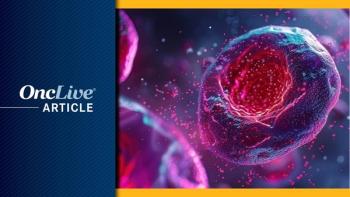
First Patients Dosed With PVSRIPO, CT-0508, and TH1902 Boosts Hope for Novel Therapies in Melanoma and Other Solid Tumors

The first patient with PD-1/PD-L1–refractory melanoma has been dosed in the phase 2 LUMINOS-102 trial, which will evaluate the safety and efficacy of PVSRIPO alone or in combination with a PD-1/PD-L1 inhibitor in this patient population.
The first patient with PD-1/PD-L1–refractory melanoma has been dosed in the phase 2 LUMINOS-102 trial (NCT04577807), which will evaluate the safety and efficacy of PVSRIPO alone or in combination with a PD-1/PD-L1 inhibitor in this patient population, according to a news release from Istari Oncology, the developer of PVSRIPO.1
“As the use of anti–PD-1/[PD-]L1 therapies has grown, so too has the need for new treatments as patients experience primary or acquired resistance and must resort to therapeutic approaches with a high incidence of serious adverse events,” said Garrett Nichols, MD, MS, chief medical officer of Istari Oncology. “Our goal is to address this unmet need, and LUMINOS-102 will be a critical step in determining whether PVSRIPO can rekindle antitumor responses in the PD-1/[PD-]L1 refractory population without adding any significant toxicity.”
The open-label phase 2 study will randomize patients with cutaneous or mucosal melanoma who have progressed on PD-1/PD-L1 inhibitors to PVSRIPO as an intratumoral injection alone or in combination with a PD-1 inhibitor.2
PVSRIPO is a novel viral immunotherapy that stimulates a CD8+ T-cell response and elicits an anticancer effect for patients.1 The agent is derived from thee type 1 Sabin polio vaccine and targets the poliovirus receptor CD155, which is expressed in most solid tumor neoplastic cells, including melanoma and glioblastoma.3
Findings from the phase 1 study of PVSRIPO demonstrated a 67% overall response rate (ORR) among 6 patients who received 3 single intratumoral injections of the immunotherapy 3 weeks apart. Moreover, PVSRIPO may elicit an abscopal response because injected and non-injected tumors appeared to respond.
Notably, no serious or dose-limiting toxicities were observed with PVSRIPO.
Following a safety run-in period with 6 patients, the phase 2 study will enroll approximately 50 patients.2 The primary end points include ORR, frequency and severity of treatment-emergent adverse effects (AEs) and AEs of special interest, and incidence of treatment discontinuation because of AEs. Overall survival, duration of response, disease control rate (DCR), 6-month DCR rate, durable response rate, and progression-free survival will serve as secondary end points.
“Being based on the poliovirus vaccine, our team was intrigued by the potential for PVSRIPO to leverage an immunological recall response to fight cancer in patients who have been vaccinated against polio. This and other unique mechanisms as well as the responses seen in the phase 1 trial encouraged us to get involved in LUMINOS-102,” said Ding Wang, MD, director of the Phase 1 Program and associate director of the Clinical Trials Office at Henry Ford Cancer Institute.1
In addition to the LUMINOS-102 trial, the first patients enrolled in two phase 1 clinical trials have been dosed with CT-0508, a novel chimeric antigen receptor macrophage (CAR-M) therapy directed toward HER2.
The therapy is being evaluated in a phase 1 study (NCT04660929) for patients with HER2-overexpressing solid tumors who do not have appropriate therapeutic options.
The study seeks to build on prior positive preclinical findings with CT-0508, according to a news release from CARISMA Therapeutics, the developer of this agent.4
“Through our novel CAR-M platform, CARISMA plans to develop new treatment options that aim to address the unmet needs of patients who are battling hard-to-treat cancers,” said Debora Barton, MD, chief medical officer of CARISMA Therapeutics. “After much investigation in the lab, we are looking forward to evaluating CT-0508 in a clinical setting to assess this first CAR-engineered macrophage product and also provide vital learnings for a potential new way of treating cancer.”
Preclinical findings with CT-0508 suggested that the novel gene-based therapy could overcome some of the barriers that have prevented CAR T-cell therapy from advancing in the solid tumor setting.
The phase 1 study will assess the safety and tolerability of CT-0508, as well as the feasibility of manufacturing the product.5 Efficacy will serve as the secondary end point.
Another phase 1 study (NCT04706962), in which the first patient has been dosed, is evaluating the peptide-drug conjugate TH1902 as a treatment option for patients with sortilin (SORT1)-positive solid tumors, according to a new release from its manufacturer Theratechnologies.6
SORT1 is expressed in many solid tumors, including ovarian, triple-negative breast, skin, lung, colorectal, and pancreatic cancer. Moreover, the sortilin receptor may be expressed in up to 90% of certain cancer types.
“Despite the progress made in recent years in the field of oncology, many patients are unfortunately not responding to current treatments or do not tolerate them well. Targeting the sortilin receptor is an exciting and promising new approach for the potential treatment of cancer. Dosing the first patient with TH1902 brings us closer to a potential much needed new option in oncology,” said Satish Shah, MD, medical director of the Gettysburg Cancer Center, and Tina A. Khair, DO, a hematologist/oncologist at the Gettysburg Cancer Center.
The phase 1 study will comprise dose-escalation and dose-expansion portions.7 Patients have to have recurrent advanced solid tumors, have relapsed on or be refractory to standard chemotherapy, surgery, and radiation, and have no effective alternative treatment options to be eligible for the first-in-human study of TH1902.
The study will assess the safety, maximum tolerated dose, and recommended phase 2 dose of the agent as primary end points. Secondary end points will include efficacy and plasma concentration.
References
- Istari Oncology announces first patient dosed in the LUMINOS-102 phase 2 clinical trial of PVSRIPO. Istari Oncology. News release. Published March 31, 2021. Accessed April 20, 2021.
https://bit.ly/3szsDW6 . - LUMINOS-102: PVSRIPO with or without immune checkpoint blockade in patients with advanced PD-1 refractory melanoma. ClinicalTrials.gov. Posted October 8, 2020. Updated March 29, 2021. Accessed April 20, 2021.
https://clinicaltrials.gov/ct2/show/NCT04577807 . - Beasley GM, Farrow NE, Landa K, et al. A phase I trial of intratumoral PVSRIPO in patients with unresectable treatment refractory melanoma. Presented at: 2020 Society for Immunotherapy of Cancer (SITC) Annual Meeting; November 9-14, 2020; virtual. Abstract 302.
- CARISMA Therapeutics announces first patient dosed in landmark clinical study evaluating engineered macrophages in humans. CARISMA Therapeutics, Inc. News release. Published March 18, 2021. Accessed April 20, 2021.
https://prn.to/32tQRpY . - CAR-macrophages for the treatment of HER2 overexpressing solid tumors. ClinicalTrials.gov. Posted December 9, 2020. Updated March 17, 2021. Accessed April 20, 2021.
https://clinicaltrials.gov/ct2/show/NCT04660929 . - Theratechnologies announces first patient dosed in phase 1 clinical trial of TH1902 for sortilin positive solid tumors. Theratechnologies. News release. Published March 24, 2021. Accessed April 20, 2021.
https://bit.ly/3suINQp . - TH1902 in patients with advanced solid tumors. ClinicalTrials.gov. Posted January 13, 2021. Updated April 1, 2021. Accessed April 20, 2021.
https://clinicaltrials.gov/ct2/show/NCT04706962 .



































